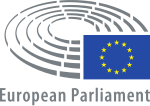References
- ↑ "What is a rapporteur?". European Law Monitor. Archived from the original on 3 April 2019. Retrieved 1 April 2019.
- ↑ "A "rapporteur" - the person who presents reports to Parliament" (Factsheet). Brussels: European Parliament . Retrieved 1 April 2019.
- ↑ "The roles of a rapporteur". EU Monitor. PDC Informatie Architectuur. Archived from the original on 7 February 2023. Retrieved 1 April 2019.
- ↑ "Shadow rapporteur". EUABC. Retrieved 1 April 2019.
- Oxford Online Dictionary
